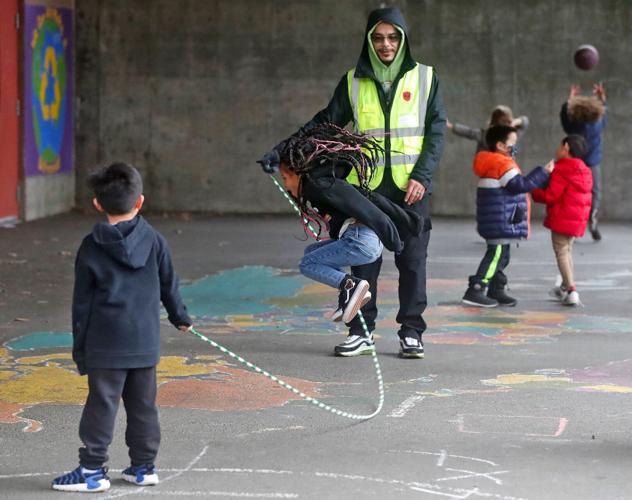There’s something about the ritual of recess that calms 10-year-old Maiya Burton Cahn’s nerves.
It’s a sacred time for the Seattle fourth grader to talk and sprint around with classmates without admonishment from adults, a form of insurance that helps her and her classmates feel like they aren’t being “forced to focus.”
This week, Maiya was among a large crowd that showed up in Olympia to voice its support for a bill to require that elementary schools provide 45 minutes of recess each day. The supporters were so numerous that lawmakers couldn’t get through the entirety of public comment.
Recess could be a powerful answer to the pandemic’s mental health and academic toll on children. The physical and social activity it enables, research shows, can lower stress hormones and help children get the wiggles out so they can be more present in the classroom. But in Washington, the amount of time offered for recess can vary widely and in some cases can be withheld as punishment.
Preserving that time would help children get the recommended hour of physical activity a day — especially low-income children, who often lack access to a backyard, a park near their home or an opportunity after the school day ends to play, supporters argue. About 20 states have already adopted similar laws around recess or physical activity.
“There is so much to be learned about problem-solving and social emotional skills” at recess, said state Sen. T’wina Nobles, D-Fircrest, who is sponsoring the bill.
A 2019 report on the “State of Play” among King County children showed many youths report not having enough time to play at a park. It also showed higher rates of obesity in South King County. Survey respondents also reported they get the recommended hour of exercise just four days out of the week.
“Physical activity is irrefutably good for us, and yet it’s not a high priority in our policies and systems,” said Julie McCleery, a University of Washington researcher who was the principal investigator on the State of Play report.
Lawmakers tried to run a similar bill last session, but it died in committee. While there isn’t any adamant opposition, Nobles said there are some fair questions about how schools would be expected to fit this extra time in the schedule, and what it would mean for teacher contracts. She doesn’t see these obstacles as insurmountable.
Other states have already figured it out for students, she said.













(1) comment
Hello yakimaherald.com administrator, You always provide helpful information.
Log in to reply
Comments are now closed on this article.
Comments can only be made on article within the first 3 days of publication.